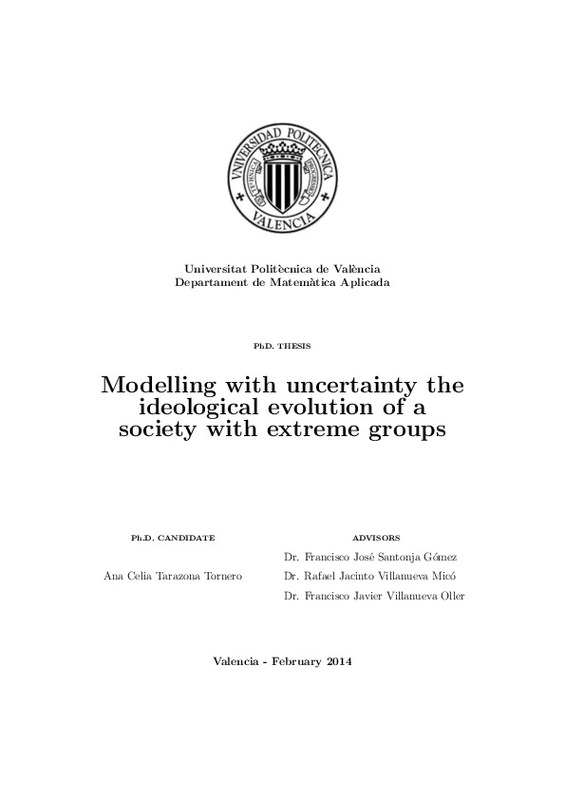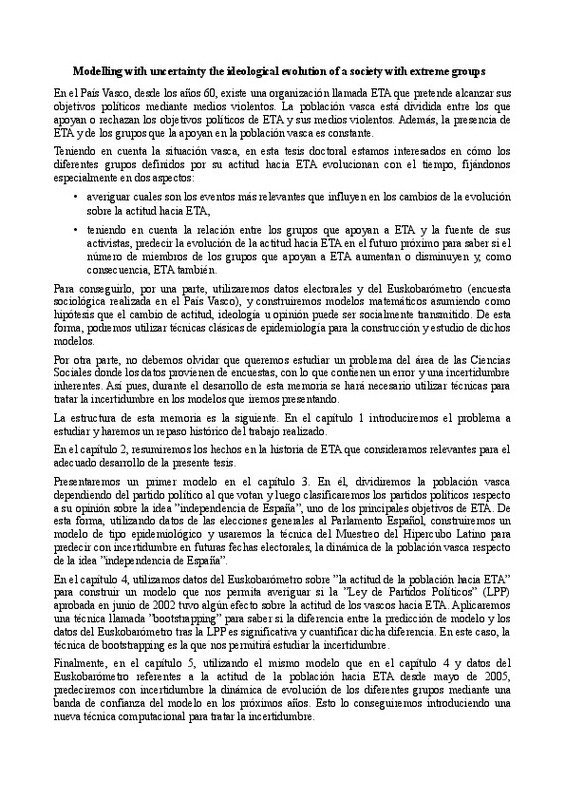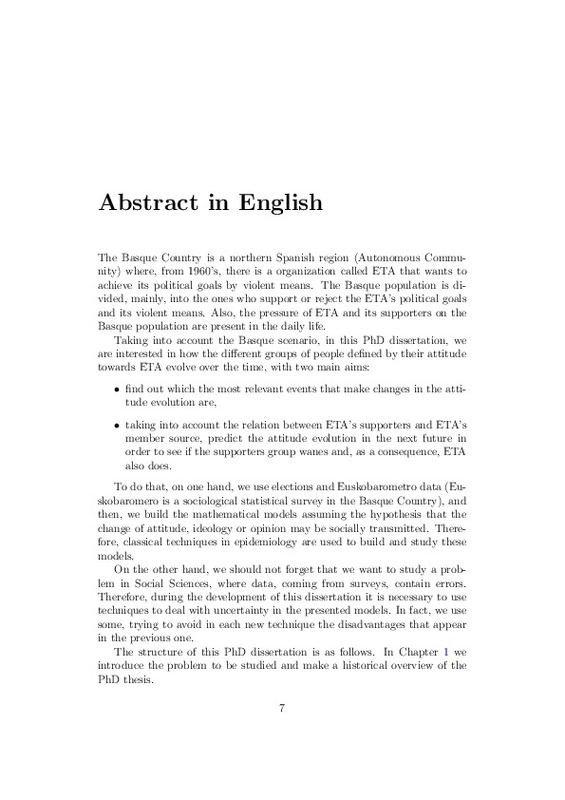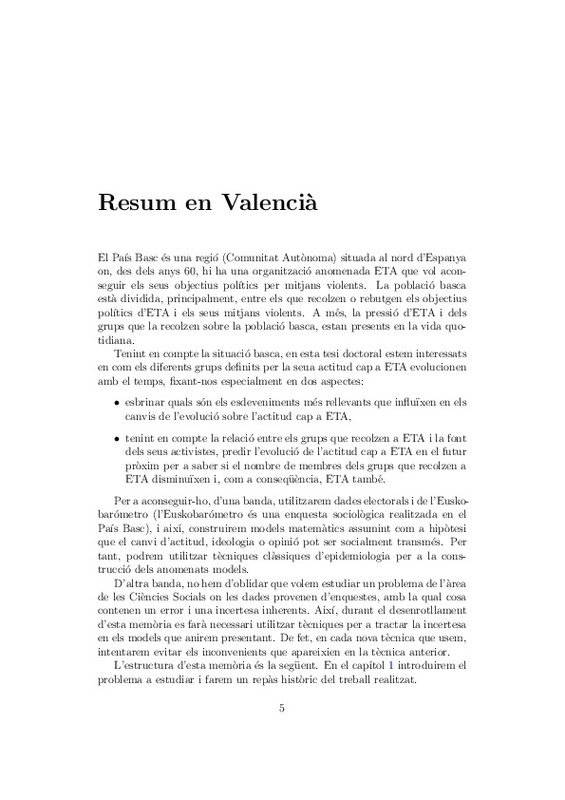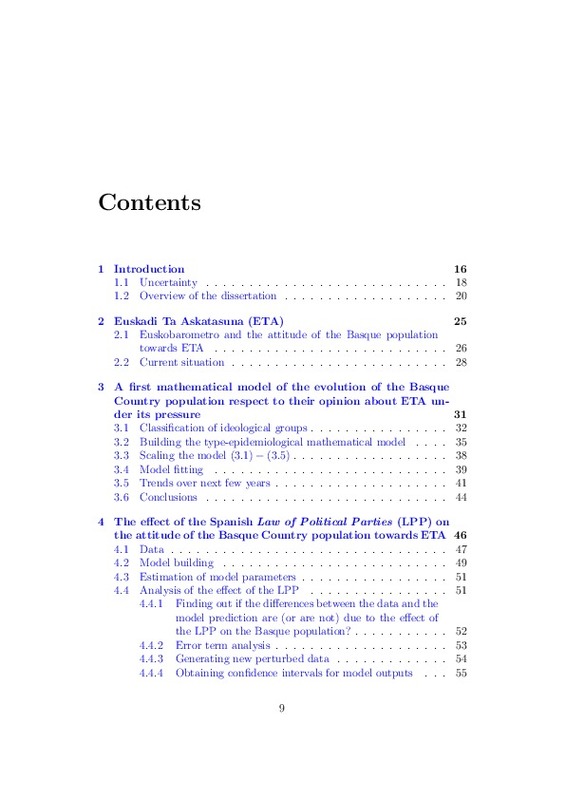- RiuNet repositorio UPV
- :
- Investigación
- :
- Tesis doctorales
- :
- Ver ítem
JavaScript is disabled for your browser. Some features of this site may not work without it.
Buscar en RiuNet
Listar
Mi cuenta
Estadísticas
Ayuda RiuNet
Admin. UPV
Modelling with uncertainty the ideological evolution of a society with extreme groups
Mostrar el registro sencillo del ítem
Ficheros en el ítem
| dc.contributor.advisor | Santonja Gómez, Francisco José
|
es_ES |
| dc.contributor.advisor | Villanueva Oller, Francisco Javier
|
es_ES |
| dc.contributor.advisor | Villanueva Micó, Rafael Jacinto
|
es_ES |
| dc.contributor.author | Tarazona Tornero, Ana Celia
|
es_ES |
| dc.date.accessioned | 2014-03-03T07:23:01Z | |
| dc.date.available | 2014-03-03T07:23:01Z | |
| dc.date.created | 2014-02-14T16:00:40Z | es_ES |
| dc.date.issued | 2014-03-03T07:22:59Z | es_ES |
| dc.identifier.uri | http://hdl.handle.net/10251/36068 | |
| dc.description.abstract | The Basque Country is a northern Spanish region (Autonomous Community) where, from 1960¿s, there is a organization called ETA that wants to achieve its political goals by violent means. The Basque population is divided, mainly, into the ones who support or reject the ETA¿s political goals and its violent means. Also, the pressure of ETA and its supporters on the Basque population are present in the daily life. Taking into account the Basque scenario, in this PhD dissertation, we are interested in how the di¿erent groups of people defined by their attitude towards ETA evolve over the time, with two main aims: ¿ find out which the most relevant events that make changes in the attitude evolution are, ¿ taking into account the relation between ETA¿s supporters and ETA¿s member source, predict the attitude evolution in the next future in order to see if the supporters group wanes and, as a consequence, ETA also does. To do that, on one hand, we use elections and Euskobarometro data (Euskobaromero is a sociological statistical survey in the Basque Country), and then, we build the mathematical models assuming the hypothesis that the change of attitude, ideology or opinion may be socially transmitted. Therefore, classical techniques in epidemiology are used to build and study these models. On the other hand, we should not forget that we want to study a problem in Social Sciences, where data, coming from surveys, contain errors. Therefore, during the development of this dissertation it is necessary to use techniques to deal with uncertainty in the presented models. In fact, we use some, trying to avoid in each new technique the disadvantages that appear in the previous one. The structure of this PhD dissertation is as follows. In Chapter 1 we introduce the problem to be studied and make a historical overview of the PhD thesis. In Chapter 2 we summarise the main facts in the history of ETA that we consider relevant to the proper development of the present dissertation. A firstmodel is presented in Chapter 3. Here, we divide the population of the Basque Country depending on the political party they vote and classify the political parties respect to their opinion on the idea of ¿independence from Spain¿, one of the main goals of ETA. Thus, with data of general elections, we build a type-epidemiological model and use the Latin Hypercube Sampling technique to predict with uncertainty over the next election dates, the dynamics of the population respect to the idea of ¿independence from Spain¿. In the Chapter 4, Euskobarometro data about the ¿population attitude towards ETA¿ are used to build a model to find out if the ¿Law of Political Parties¿ (LPP) passed in Jun 2002 had e¿ect on the attitude towards ETA of the Basque Population. We use a bootstrapping technique to know if the di¿erences between the model prediction and Euskobarometro data after LPP are significative and quantify these di¿erences. In this case, bootstrapping is the technique that allows us to deal with the model uncertainty. In the Chapter 5, using the same model as in the Chapter 4 and Euskobarometro data about the population attitude towards ETA since May 2005, we predict with uncertainty the evolution dynamics of the groups providing a model confidence band prediction over the next few years. To do that we introduce a new computational technique to deal with the model uncertainty. | en_EN |
| dc.language | Inglés | es_ES |
| dc.publisher | Universitat Politècnica de València | es_ES |
| dc.rights | Reserva de todos los derechos | es_ES |
| dc.source | Riunet | es_ES |
| dc.subject | Modelos dinámicos en Ciencias Sociales | es_ES |
| dc.subject | Dinámica de la actitud hacia ETA | es_ES |
| dc.subject | Tratamiento de la incertidumbre en modelos dinámicos | es_ES |
| dc.subject | Cuantificación del efecto de las leyes | es_ES |
| dc.subject.classification | MATEMATICA APLICADA | es_ES |
| dc.title | Modelling with uncertainty the ideological evolution of a society with extreme groups | |
| dc.type | Tesis doctoral | es_ES |
| dc.identifier.doi | 10.4995/Thesis/10251/36068 | es_ES |
| dc.rights.accessRights | Abierto | es_ES |
| dc.contributor.affiliation | Universitat Politècnica de València. Departamento de Matemática Aplicada - Departament de Matemàtica Aplicada | es_ES |
| dc.description.bibliographicCitation | Tarazona Tornero, AC. (2014). Modelling with uncertainty the ideological evolution of a society with extreme groups [Tesis doctoral]. Universitat Politècnica de València. https://doi.org/10.4995/Thesis/10251/36068 | es_ES |
| dc.description.accrualMethod | TESIS | es_ES |
| dc.type.version | info:eu-repo/semantics/acceptedVersion | es_ES |
| dc.relation.tesis | 6861 | es_ES |
Este ítem aparece en la(s) siguiente(s) colección(ones)
-
Tesis doctorales [5389]






